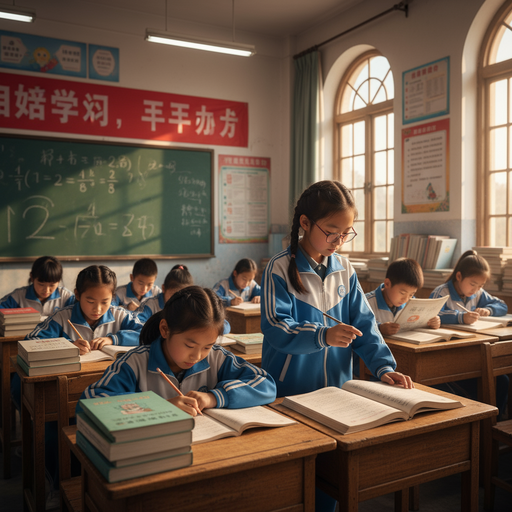Why China's Double Reduction Policy got it right

In 2021, the Chinese government issued its so-called Double Reduction Policy, aimed at reducing academic pressure on children. Wikipedia summarizes the key measures as follows:
- Reduce time spent on homework. The policy sets limits on total homework given: no written homework for 1st and 2nd grades; up to 60 minutes of average homework for 3rd through 6th grades; no more than 90 minutes of written homework for middle school. This piece also contains improvements to homework design, homework support from teachers, and guidance to balance time at home spent on classwork with other activities.
- Improve after-school services. The policy requests that schools make more time for after-school services, expand channels for separate faculty to carry out these services, and improve the diversity of social and academic activities. It requires that after-school services not be used as additional class time. The policy also strengthens and improves free online study services by region.
- Regulate extracurricular training and private tutoring. The new policy creates oversight and filing systems for extracurricular training and tutoring institutions, bans the approval of new institutions, and limits and regulates fee collection. On 23 July, The State Council of the People's Republic of China announced that they would no longer issue new for-profit licenses for tutoring institutions and required existing ones to stop tutoring “core curriculum courses” for students having compulsory education. All after-school tutoring institutions became non-profits. The Chinese government also stated this heavy regulation on the tutoring industry aimed to eliminate the unequal educational resource allocation phenomenon.
- Increase quality of education, enrollment and appraisal: Education departments promote balanced development of compulsory education across regions, hoping to reduce the educational gap between urban and rural students. Primary and junior high schools in China are also explicitly forbidden from ranking students' academic performance or using such rankings for promotion to higher levels of school. The Ministry of Education has emphasized students' personality rights to avoid the negative psychological pressure caused by the public examination ranking. Banning rankings protects students' psychological self-esteem, especially for adolescents still in a fragile growth stage. The abolition of rankings and “frequent formal exams” has improved students' enthusiasm for learning and changed China's long grade-centered and test-oriented education system.
- Government support, pilots and implementation. The policy sets standards for regional and provincial governments to allocate funds and staff to support its improved procedures. It also details the requirements for pilot work, designates specific cities and regions to carry out pilots, and clarifies departmental responsibilities and procedures.
Let's take a look at how China mostly got this right, despite ongoing issues. Then I will contrast China's approach with neighboring Korea, a country with similar educational pressures that has got it all wrong.
China's modest success
This article is based on research from China itself. Although some readers may question the reliability of studies performed by Chinese universities, I need to point out that China is far from alone in its manipulation of supposedly unbiased research. There is a long history of scientific censorship around the world, not exclusive to China. Whether it's research on sexual harm, or on politicized medical matters the least bit controversial, scientific research in the west too is subject to censorship. Therefore, research from China is used in this article, to be treated with the same regard and skepticism as that which comes from supposedly 'trustworthy' Anglo countries.
A review of a variety of studies on the Double Reduction policy revealed the following outcomes so far:
- The quantity and difficulty of homework was significantly reduced for younger students in many, but not all, parts of China.
- After-school programs partially succeeded as a substitute for homework, allowing students to engage in healthier activities, but were in some cases dull, repetitive, or poorly tailored to student needs.
- Improvements in students' physical and mental health were reported, notably in cases where after-school sports programs were deployed.
- Some parents actually increased spending on private tuition, or provided their own homework, to 'make up for' a reduction in homework distributed by schools.
- Teachers reported feeling extra pressure without adequate compensation, and some parents were uneasy about their children being inadequately prepared for tests.
Ultimately, this is a fairly new policy that aims to massively overhaul how education is conducted in one of the world's vastest and most populous countries. While successes have so far been moderate, more time is needed for more effective implementation. As a teacher myself, I do sympathize somewhat with the teachers who reported feeling burdened by new challenges, but as a moderate youth rights advocate and MAP, I am very much in favor of the child-centered approach that prioritizes the welfare of students over the anxieties of teachers and parents.
The main challenge for the policy, it seems, is the impossible juxtaposition of a child-centered approach to learning and a testing system that demands extreme levels of memorization and rote learning. While there are ongoing attempts to improve the system, the need for grueling study in order to excel at the be-all and end-all Gaokao exams remains a significant hurdle to overcome in reducing the levels of stress felt by students, teachers, and parents. Replacing the current system with one that better tests intelligence, rather than memorized facts and knowledge of test-taking methodology, would allow the Double Reduction policy to really succeed. Education policy is clearly headed in the right direction.
Korea's disgraceful disregard
In neighboring Korea, where children rank the unhappiest in the OECD and even lower than those growing up in impoverished countries, the focus is more on making things easier for parents. While China has been busy pushing through reforms aimed at reducing the burden on children, Korea has been brutally honest in just how little it cares. Korean children have long suffered from the scourge of hagwon, after-school 'academies' that start from preschool and often teach just a single subject. Many students attend several each day on top their regular schooling, but their suffering is apparently not of concern. According to former President Yoon Suk Yeol, who announced new reforms to extend public schooling to up to 14 hours per day, "School care is necessary to enable parents to leave their children with peace of mind and allow them to engage in economic and social activities to their heart's content." The Korea Times elucidates further, its brutally honest title reading "Gov't to dramatically expand after-school programs to fight low birthrate". Rather than work to reduce the number of hours children must study, the Korean government is more focused on making sure their grueling hours - potentially from 7am to 9pm - are free or cheap enough that parents are still able to slave away at the country's mega corporations and hopefully pop out more babies. Never mind if those children are happy or not; their welfare is very much secondary to their future purpose of propping up the doomed population pyramid of a miserable and dying nation.
Ironically, much like America justifies its horrific global acts against children by playing up its war on pedophiles, so too does Korea overcompensate with its extreme 'child abuse' laws. Under its idiotically vague Child Welfare Act, virtually anything can be considered child abuse, including a teacher simply raising their voice at a badly behaved student. This has led to parents threatening teachers with charges simply for trying to manage the classroom, and even to teacher suicides. Not content with facilitating the murder of its devoted teachers for simply doing their jobs, Korea happily imprisons men for AI-generated pictures of children (less than for a man who ran a massive for-profit child porn empire), all the while allowing children to be ground to the bone in classrooms so that their parents can work brutal hours and breed future little wage slaves.
Keeping the west away
Coming back to China, one cynical interpretation of the Double Reduction Policy has been that it represents an attempt to keep the west away. How so? A significant number of crammers in East and Southeast Asia are focused on English, employing vast swathes of native speakers from Anglo countries. Naturally, these teachers will come with their own cultures and beliefs, and despite being told to avoid politics, there is no doubt that their ways of being will have some influence on the local students. Is this a case of paranoia? Probably not. Anglo countries have long used soft influence, in addition to their many bombs and acts of genocide, to manipulate the world around them. Unlike Korea, flailing on its knees to placate yet another monstrous American president, China is doing the right thing in reducing the academic burden on its children while keeping the west away.
